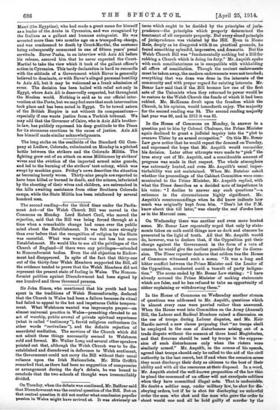On Tuesday, when the debate was continued, Mr. Balfour said
that Disendowment was the central question of the Bill. But on that central question it did not matter what conclusion popular passion in Wales might have arrived at. It was obviouely an
issue which ought to be decided by the principles of juris- prudence—the principles which properly determined the treatment of all corporate property. But every sound principle of jurisprudence was violated by the BIM Even in Horde Rule, deeply as he disagreed with it on pinatical grounds, be found something splendid, impressive, and dramatic. But the Welsh Church Bill was "fundamentally nothing but a Bill for robbing a Church which is doing its duty." Mr. Asquith spoke with such conciliatoriness as is compatible with withholding all offers of ConeiliatIon. Though the ancient endowments must be taken away, the modern endowments were no t. ton c h e ; everything that was done was done..ia the interests of the community and with proper regard for existing interests. Mr.. Boner Law said that if the Bill. became law one of the first acts of the Unionists when they returned to power would he to restore to the Welsh Church the funds of which it had been robbed. Mr. McKenna dwelt upon the freedom which the Church, ha his opinion, would henceforth enjoy. The majority for the second reading was 84. The second reading majority last year was 99, and in 1912 it was 81.


























































 Previous page
Previous page